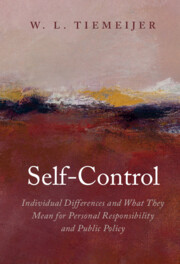 Self-Control
Self-Control Book contents
- Self-Control
- Self-Control
- Copyright page
- Dedication
- Epigraph
- Contents
- Figures
- Tables
- Acknowledgments
- 1 Introduction
- Part I Self-Control
- 2 A Gift for Life
- 3 How Situation Undermines Self-Control
- 4 Building Self-Control?
- 5 The Value of the Future
- 6 The Self-Control Effects of Poverty
- Part II Implications for Society and Politics
- Notes
- Bibliography
- Index
4 - Building Self-Control?
from Part I - Self-Control
Published online by Cambridge University Press: 20 August 2022
- Self-Control
- Self-Control
- Copyright page
- Dedication
- Epigraph
- Contents
- Figures
- Tables
- Acknowledgments
- 1 Introduction
- Part I Self-Control
- 2 A Gift for Life
- 3 How Situation Undermines Self-Control
- 4 Building Self-Control?
- 5 The Value of the Future
- 6 The Self-Control Effects of Poverty
- Part II Implications for Society and Politics
- Notes
- Bibliography
- Index
Summary
Can self-control be improved through daily practice or better technique? In this chapter, I show that the popular idea that self-control is “like a muscle” that can be strengthened through exercise is not supported by recent research. Teaching people “self-control techniques” is no solution either, as it may even widen the gap between those who are good at self-control and those who are not. How about new techniques such as “commitment devices” and “nudging”? Unfortunately, although some nudges seem promising, they cover only a small subset of the situations that call for good self-control. The conclusion of this chapter is that “some people simply have more talent for self-control than others, and therefore some people will have better prospects at achieving health, wealth, and happiness than others. We may have no choice but to accept this reality.”
Keywords
Information
- Type
- Chapter
- Information
- Self-ControlIndividual Differences and What They Mean for Personal Responsibility and Public Policy, pp. 73 - 93Publisher: Cambridge University PressPrint publication year: 2022